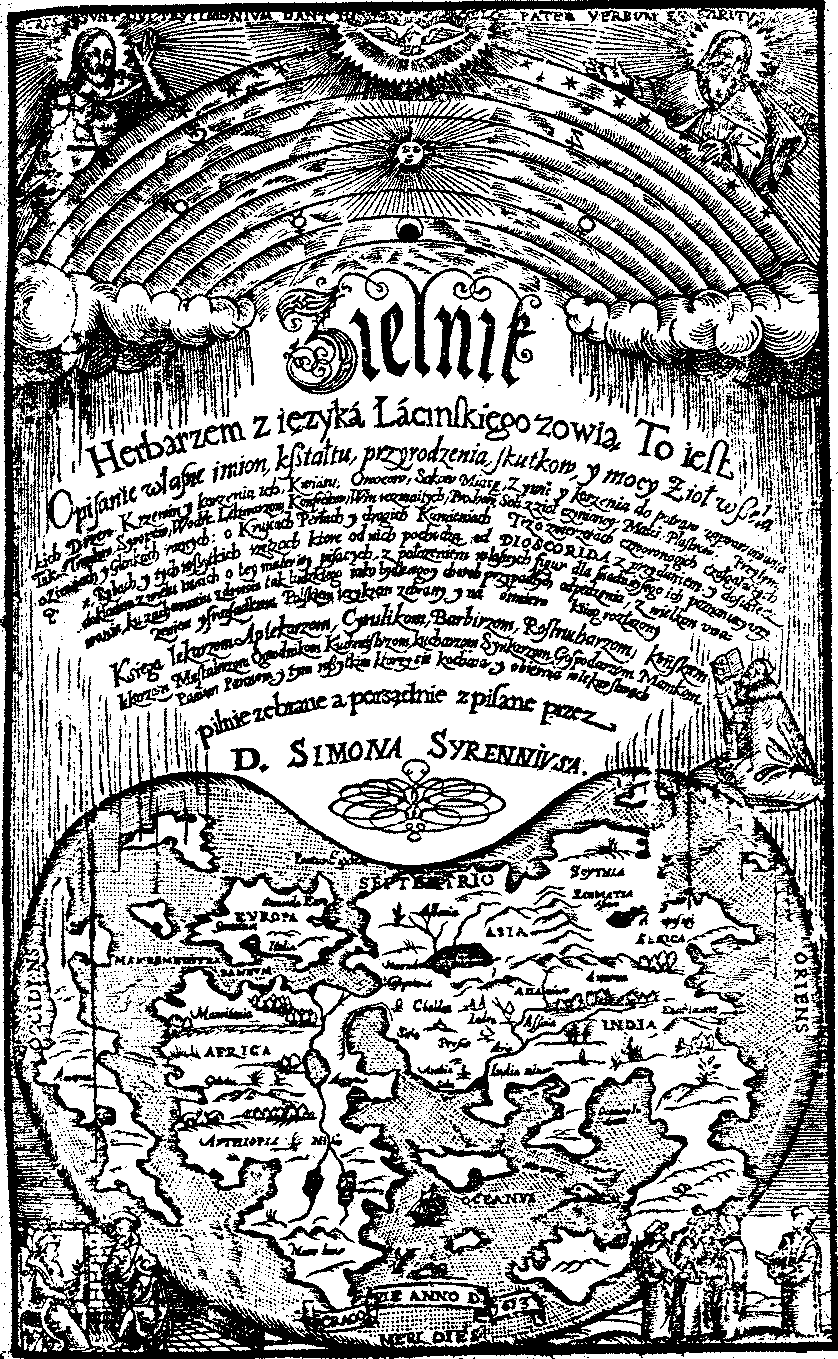|
Szymon Syreński (Syreniusz)
Simon Syrenius () (1540–1611) was a pre-Linnean Polish botanist and academic. A native of Oświęcim, he taught at the Jagiellonian University. Anna Vasa served as his patron, and with her help, Syrenius published a botanic atlas in five volumes consisting of 1,540 pages describing 765 plants. Zielnik (Herbarium) The first edition of Syrenius' botanical atlas was published by Bazyli Skalski in Cracow in 1613 under the title: The ''Zielnik'' is an illustrated atlas of practical plants, which includes information about the most important known and used plants in central and southern Europe in the sixteenth century. The work describes 765 plants, primarily medicinal ones, and their usage in the home, in industry, and in veterinary medicine. The recipes explain how to prepare plant medicines and food, as well as methods of pest control, how to treat farm animals, etc. It also records old folk traditions related to flora. Most of these descriptions are accompanied by woodcuts ill ... [...More Info...] [...Related Items...] OR: [Wikipedia] [Google] [Baidu] |
Polish People
Polish people, or Poles, are a West Slavic ethnic group and nation who share a common History of Poland, history, Culture of Poland, culture, the Polish language and are identified with the country of Poland in Central Europe. The preamble to the Constitution of the Republic of Poland defines the Polish nation as comprising all the citizenship, citizens of Poland, regardless of heritage or ethnicity. The majority of Poles adhere to Roman Catholicism. The population of self-declared Poles in Poland is estimated at 37,394,000 out of an overall population of 38,512,000 (based on the 2011 census), of whom 36,522,000 declared Polish alone. A wide-ranging Polish diaspora (the ''Polish diaspora, Polonia'') exists throughout Eurasia, the Americas, and Australasia. Today, the largest urban concentrations of Poles are within the Warsaw metropolitan area and the Katowice urban area. Ethnic Poles are considered to be the descendants of the ancient West Slavic Lechites and other tribes t ... [...More Info...] [...Related Items...] OR: [Wikipedia] [Google] [Baidu] |
Latin Language
Latin ( or ) is a classical language belonging to the Italic languages, Italic branch of the Indo-European languages. Latin was originally spoken by the Latins (Italic tribe), Latins in Latium (now known as Lazio), the lower Tiber area around Rome, Italy. Through the expansion of the Roman Republic, it became the dominant language in the Italian Peninsula and subsequently throughout the Roman Empire. It has greatly influenced many languages, Latin influence in English, including English, having contributed List of Latin words with English derivatives, many words to the English lexicon, particularly after the Christianity in Anglo-Saxon England, Christianization of the Anglo-Saxons and the Norman Conquest. Latin Root (linguistics), roots appear frequently in the technical vocabulary used by fields such as theology, List of Latin and Greek words commonly used in systematic names, the sciences, List of medical roots, suffixes and prefixes, medicine, and List of Latin legal terms ... [...More Info...] [...Related Items...] OR: [Wikipedia] [Google] [Baidu] |
16th-century Polish Botanists
The 16th century began with the Julian year 1501 (represented by the Roman numerals MDI) and ended with either the Julian or the Gregorian year 1600 (MDC), depending on the reckoning used (the Gregorian calendar introduced a lapse of 10 days in October 1582). The Renaissance in Italy and Europe saw the emergence of important artists, authors and scientists, and led to the foundation of important subjects which include accounting and political science. Copernicus proposed the heliocentric universe, which was met with strong resistance, and Tycho Brahe refuted the theory of celestial spheres through observational measurement of the 1572 appearance of a Milky Way supernova. These events directly challenged the long-held notion of an immutable universe supported by Ptolemy and Aristotle, and led to major revolutions in astronomy and science. Galileo Galilei became a champion of the new sciences, invented the first thermometer and made substantial contributions in the fields of phy ... [...More Info...] [...Related Items...] OR: [Wikipedia] [Google] [Baidu] |
People From Oświęcim
The term "the people" refers to the public or Common people, common mass of people of a polity. As such it is a concept of human rights law, international law as well as constitutional law, particularly used for claims of popular sovereignty. In contrast, a people is any plurality of Person, persons considered as a whole. Used in politics and law, the term "a people" refers to the collective or community of an ethnic group or nation. Concepts Legal Chapter One, Article One of the Charter of the United Nations states that "peoples" have the right to self-determination. Though the mere status as peoples and the right to self-determination, as for example in the case of Declaration on the Rights of Indigenous Peoples, Indigenous peoples (''peoples'', as in all groups of indigenous people, not merely all indigenous persons as in ''indigenous people''), does not automatically provide for independence, independent sovereignty and therefore secession. Indeed, judge Ivor Jennings i ... [...More Info...] [...Related Items...] OR: [Wikipedia] [Google] [Baidu] |


